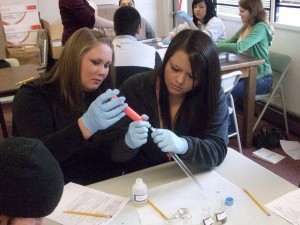CURRICULUM ADAPTATIONS
The purpose of this page is to showcase the many adaptations teachers have made to our existing systems biology modules. Some of these adaptations have been made for classrooms, some for summer programs, senior projects, and science fairs. If you have any module adaptations you would like to share here for others to use, please contact the Systems Education Experiences (SEE) team at see@isbscience.org for more information or use the contact form below. Please also see our Community Contributed pages to view other lessons and modules that have been submitted by partners.
Updates by District and State Leaders with Classroom Teachers for their Schools
The California Board of Education integrated our Ocean Acidification and Introduction to Systems modules into their High School 3-course model in 2016.
- Please see this webpage to view all of their 2016 science frameworks and instructions. Please see Chapter 7.2 of this PDF to view their instructions for integrating our OA resources into courses.
SEE Teacher Mari Knutson Herbert of Lynden High School and her district team developed a year-long storyline for their 9th-grade integrated science courses that features multiple SEE modules.
- This PDF outlines and maps the NGSS addressed, the storyline and the learning progression.
Updates for Summer Courses
Exploring Biological Systems, Genetic Research and Ethics (aka Dynamic DNA)
- Each summer, WA Network for Innovative Careers provides 0.5 occupational education credits to eligible 10th-12th grade students who attend this 3-week course. If you would like an OSPI approved framework and syllabus for this course please contact us below. This 90-hour course was originally developed through a collaboration between Northwest Association for Biomedical Research, DigiPen Institute for Technology, and SEE in Baliga Lab at ISB.
Updates When Working on Science Fairs and Independent Projects
- If you are interested in adapting our curriculum for independent projects, please contact us. Numerous teachers and students have completed successful projects. We’re happy to connect you to others and/or walk you through your own projects.
Updates by Classroom Teachers for their Classroom
Eric Kessler, Bioscience Strand Leader for the Blue Valley School District, has adapted Lessons 1-2 from Ecological Networks and the Environmental Influence on Gene Networks module for his bioscience students
- Combined Lessons 1 and 2 from Introduction to Systems Adapted for Bioscience Students – this includes a deeper introduction to bioinformatics and a clear connection to mathematical concepts.
- Adaptation of Environmental Influence on Gene Networks Part 1 to accompany the article in American Scientist, May-June 2007, Extreme Microbes: Salt-loving microorganisms are helping biologists understand the unifying features of life and molecular secrets of survival under extreme conditions, by Shil DeSarma.
- Adaptation of Environmental Influence on Gene Networks Part 2 which covers combined content from Lessons 2, 3 and 4.
Amanda Cope at the Monroe, WA Leaders in Learning Program combined Ecological Networks and Environmental Influence on Gene Networks into a three-week, intensive systems and inquiry and short course.
Since a formal lab setting was not available, students completed all experiments on tables with stir plates and other needed equipment. The lessons were taught in the order listed on our module pages and with Ecological Networks being taught first. Students creatively designed their own experiments in the Environmental Impact on Gene Networks in teams of 3-5 students – for many this was their first lab experiment. Amanda and her students made the most of their environment and available resources to make this a very valuable experience for all.


